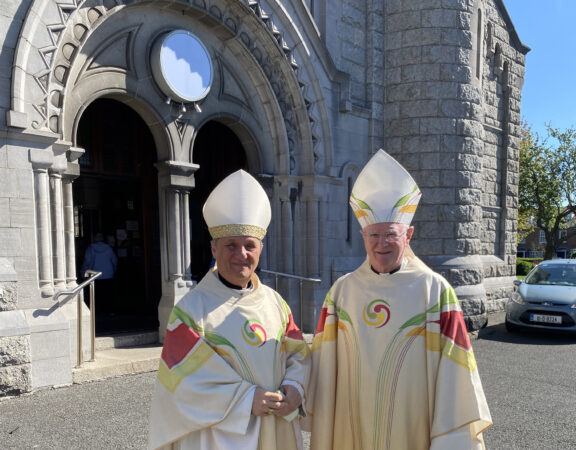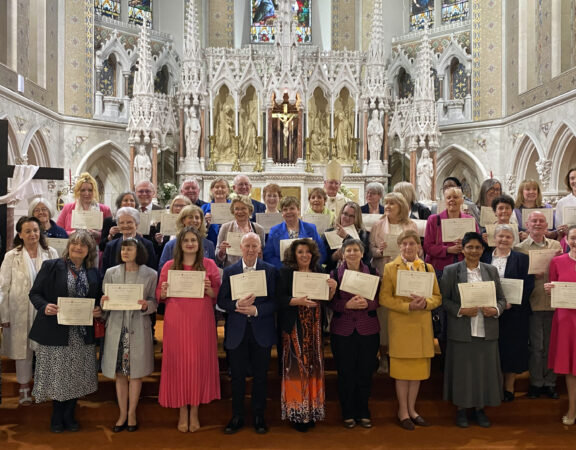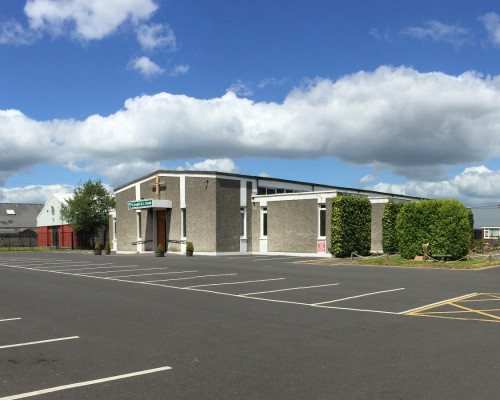Book Presentation
PAUL CARDINAL CULLEN – PORTRAIT A PRACTICAL NATIONALIST
by Dr Ciaran O’Carroll
Speaking Notes of
Most Rev. Diarmuid Martin
Archbishop of Dublin and Primate of Ireland
Most Rev. Diarmuid Martin
Archbishop of Dublin and Primate of Ireland
———-
Holy Cross College, Clonliffe, 11th December 2008
Holy Cross College, Clonliffe, 11th December 2008
Doctor Ciaran O’Carroll’s book contains a photograph of Cardinal Cullen, surrounded by a group of clergy, on the steps to Clonliffe College which we all climbed this evening. It was taken on the occasion of Cullen’s return to Dublin in 1866 from the reception of his Cardinal’s Red Hat.
These clergy represent two aspects of Cullen’s life. There are the senior clergy of the diocese with the Deans and the staff of Clonliffe College, on the one hand, and there are two priests who are his nephews, on the other, the future Cardinal Archbishop of Sydney, Patrick F. Moran and the future Bishop of Dunedin, Michael Verdon.
Cardinal Cullen as his successor Cardinal Desmond Connell notes in the opening lines of his Foreword, to Father O’Carroll’s book, was “primarily a pastor”. His achievements as a pastor in Ireland were extraordinary and were to have a vast effect on the Church in Ireland down to our own times. Cullen introduced reforms of popular piety, of ecclesiastical discipline and of renewal in religious practice. This seminary was to play a major part in his efforts to provide theological and spiritual formation for a new generation of priests in the Archdiocese of Dublin. The fact that Cullen chose to the buried under the high altar of the Church of the Holy Cross shows just how central the new seminary was to be in Cullen’s life and mission in Dublin.
Cullen was a pastor but also a Churchman. His commitment to and love of the Church was to be seen in the major influence he exercised on Church life in other parts of the world, symbolised in a way in those two nephews pictured in the photograph, Cardinal Moran and Bishop Verdon. Cullen was responsible for providing bishops, many of whom who were indeed in some way related to him, for senior positions in the Church all over the English speaking world. His influence in Rome was wide-ranging.
Cullen’s Catholicism was very much “roman” Catholicism, in the sense the he was profoundly marked by the experience of living in Rome as a student, as a priest and as Rector of the Irish College and of Propaganda College and by the ecclesiastical and political events he had witnessed at first hand during that time.
Father O’Carroll’s book looks however at other aspects of Cardinal Cullen’s work and personality, especially his involvement in the social and political situation of Ireland. He was to be a Cardinal and Archbishop of Dublin and Apostolic Delegate in Ireland at a complicated moment in Irish history, where questions of politics, nationalism, the rights of the poor, land rights and the rights of the Church were intertwined but rarely identical. Cullen’s experience of Italian nationalism made him hypersensitive to any anti-clerical dimension in a political movement and even more sensitive regarding any political movement which advocated use of physical force and revolution.
The lack of an effective and unified political force among Catholics after the death of O’Connell left the path to possible revolutionary politics more open than heretofore. Cullen tried to plod a line which was his own, a line which attempted to maintain a certain independence, but one marked by his own personal history and personality which inevitably saw him fully aligned with no one and perhaps disappointing to everyone.
As a pastor his fundamental interest was in the rights of the Church and of believers at a time in which religious discrimination was still very much in place and was at times intensified and used as carrot and stick to appease or control a vulnerable Irish Catholic community. Yet his Roman training stressed the concept of loyalty to legitimate authority, which however since the Act of Union had become progressively less Irish. The Irish and indeed the Catholic Church, majorities in Ireland, had become minorities in the broader United Kingdom.
As often happens when tensions and polarisations occur between varying rights and interests, there were attempts for various political groupings to make use of the Church for their legitimate interests and at times for causes and means to achieve them which were marked by ambiguity.
Cullen tried to steer a clear path of distinction between what he felt a religious leader should be doing or ensuing and what should legitimately be the area of competence of politics, including the political groupings of Catholics. Perhaps he had an over ambitious concept of creating what in Italy until recently was called “the unity of Catholics in political life”, something which cannot be carved out in a cultural climate where the premises for such unity are not there.
It is interesting that this most influential of Irish Catholic leaders in his time, a friend of Pontiffs and Roman Cardinals, did not always get the sympathy and support that he might have expected on political issues from the Papacy and the Holy See, where the question of Ireland was always seen with in a wider optic of the politics of the Papacy, still a political power, but a political power fighting to survive in its current form.
Father O’Carroll, on the basis of an extraordinary study of primary sources many of which up until now un-researched, presents us with a different picture of “Cullen, the man” than appears in conventional reading of history. Rather than the uncompromising reformer who found ways of impressing his views of the entire Church, we see a Cullen dogged by depression and a sense of failure, a person suffering from fatigue and near breakdown, unable to sleep for nights on end.
The challenge which Cullen faced is not unlinked to the realities of Irish political culture at various points in history, and even our own times. There has been tendency of identity of Catholicism and various expressions of nationalism which have grown and waned with time.
Toady, that challenge is even more complicated. Pluralism, a clearer understanding of appropriate relations between Church and State and a greater secularism in Irish society have all contributed to a changed relationship between Church and State, between faith and culture. Irish culture has always had a love-hate relationship with the Church. Even at moments when the hate side of that relationship has been the more prominent, it does not want to be cut off from the Church and, as in Cullen’s time, is apt to look for the support of the Church for political causes.
A major element of Irish Nationalism and Irish self-understanding today is tolerance. Such a culture of tolerance can easily result in the desire to have a “national Church of tolerance”, a moral authority which can teach ideals yet also embrace almost every shade or moral and political opinion.
Cullen learned that it is not possible to please everyone. When the Church attempts to take an independent position, distancing itself from dimension of current Irish culture, it may well end up like Cullen: fully aligned with no one and perhaps disappointing to everyone.
We need to reflect more deeply on the teaching of Pope Benedict XVI on the distinctive roles of Church and politics and on the respective roles of faith and reason as presented in the Encyclical Deus Caritas Est. Strikingly the Pope stresses that “a just society must be the achievement of politics, not of the Church. Yet the promotion of justice through efforts to bring about openness of mind and will to the demands of the common good is something which concerns the Church deeply… The Church cannot and must not take upon herself the political battle to bring about the most just society possible. She cannot and must not replace the State. Yet at the same time she cannot and must not remain on the sidelines in the fight for justice. She has to play her part through rational argument and she has to reawaken the spiritual energy without which justice, which always demands sacrifice, cannot prevail and prosper”.
Doctor O’Carroll’s book is an extraordinary well researched work on a person and on events of the nineteenth century which, at least in me, challenged me to look at situations of today in a different way.









